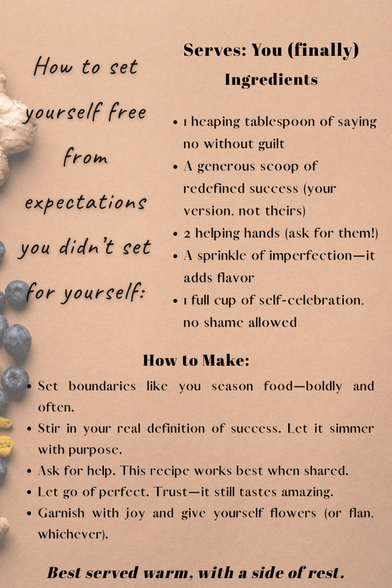Mel Robbins Let Them Theory Explained for You
There’s a theory I came across recently—one that cracked something open inside me. It’s called “The Let Them Theory.” Mel Robbins popularized it in her book, and the idea is simple: if people want to misunderstand you, let them. If they want to leave, let them. If they want to doubt you, let them.
It’s not a theory built on spite. It’s not about proving people wrong or cutting them off with attitude. It’s about release. About turning your energy inward and saying: I’ve got better things to focus on—namely, me.
I didn’t know there was a name for what I’d been practicing in pockets of my life for years, but when I heard it framed this way, I felt seen.
But of course, it gets complicated when you throw culture into the mix.
Cultural Expectations Don’t Let You “Let Them”
If you come from a collectivist culture—like many Latine communities—you’re often raised to not let people be. You’re taught to correct, to adjust, to keep the peace, to stay even when it costs you.
- They said something offensive? Be polite.
- They dismissed your boundaries? Be forgiving.
- They questioned your choices? Explain harder.
Because we’re raised to protect the family image. To not make waves. To sacrifice “self” for the greater good, especially when that good is defined by others.
So when I started living by “Let Them,” it felt rebellious. But more than that—it felt freeing.
Let them think I’m too American.
Let them say I’m too Dominican.
Let them misunderstand the way I parent, or pray, or write, or live.
Let them believe what they want about how I left, how I stayed, how I speak.
Let them gossip. Let them guess.
It’s not my job to keep adjusting to make everyone else more comfortable.
Especially when my comfort has never been anyone’s priority but mine.
“Let Them” Is Not Indifference—It’s Boundaries
Here’s where I think people get it twisted. Practicing “Let Them” doesn’t mean I don’t care. It means I’m choosing where my care goes. It means I no longer chase validation from people who have made it clear they don’t value my voice, my identity, or my growth.
“Let Them” doesn’t mean I don’t feel the sting. It means I don’t let that sting run my life.
It’s not a wall—it’s a doorway away from trying to be palatable.
How “Let Them” Heals Cultural Guilt
Cultural guilt is real. It lingers in the background when you try to live differently, dream louder, or move beyond the path that was laid out for you. Especially as a daughter. As a mother. As a creative. As a bruja. As a woman.
But “Let Them” is a balm for that guilt.
It says:
Let them say I changed.
Let them say I’m different now.
Let them question the book I wrote, the words I chose, the stories I told.
Let them.
I don’t owe them a version of myself that stays small.
And the more I lean into this mindset, the more I see the shift in how I spend my energy. I no longer spend days rehearsing conversations that I’ll never have. I don’t write long paragraphs to defend myself in my head. I live. I speak. I write. I move.
And those who are meant to walk with me in this season? They don’t need convincing.
The Ordinary Bruja: Book One of Las Cerradoras Series – Johanny Ortega
When grief pulls Marisol Espinal back to Willowshade, she uncovers a legacy buried in shadows, silence, and ancestral magic. The Ordinary Bruja is a haunting coming-of-age story that blends psychological horror with Dominican folklore and magical realism. For fans of Silvia Moreno-Garcia and Isabel Cañas.
If you love what you read, I’d be honored to hear your thoughts. Please leave a review on your preferred platform and let other readers find the magic in The Ordinary Bruja.
$4.99 – $23.99Price range: $4.99 through $23.99 Shop nowProcrastination, Culture, and the Soft Rebellion
Now, I’ll be honest—“Let Them” also requires self-awareness. Because there are times when I let myself wallow a little too long. I’ll call it rest, but really it’s resistance. I’ll call it peace, but it’s avoidance.
That’s when I check myself.
Because “Let Them” also applies inwardly.
Let the inner critic chatter.
Let the doubt be there.
Let it sit—and then keep going anyway.
It’s not about never being triggered or never second-guessing. It’s about not letting those things run your life.
The Beauty in Letting Go
There’s power in refusing to explain yourself to people who are committed to misunderstanding you. There’s liberation in not performing your worth for family, for community, for followers, for anyone.
And there’s beauty in choosing to be—without a constant need to be understood.
So if you’re navigating the tension between who your culture told you to be and who you’re becoming, this is for you:
Let them be confused.
Let them shake their heads.
Let them miss the version of you that dimmed your light to make them comfortable.
And let yourself rise in the process.
#boundaries #culturalExpectations #emotionalGrowth #LatineIdentity #letThemTheory #MelRobbins #peoplePleasing #reclaimingPeace







